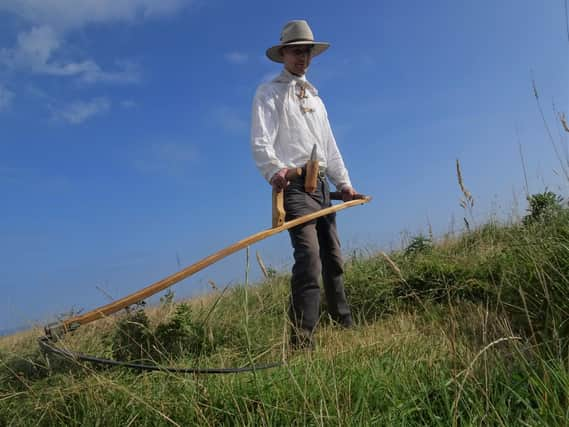Yorkshire nature reserve ditches lawnmowers and turns to eco-friendly ancient technique of scything to manage wildflower meadows


Petrol or electric mowing equipment is no longer at the fore at RSPB Bempton Cliffs, near Bridlington, thanks to the reintroduction of a medieval grass-cutting implement called a scythe.
Martin Stevens, from Hunmanby, now organises a regular volunteer group who meet to cut down the grassland and wildflower meadows at the clifftop reserve, which is famous for its seabird colonies, in a sustainable way.
Advertisement
Hide AdAdvertisement
Hide AdMr Stevens began using a scythe - a centuries-old farming tool that originated in Europe - around three years ago and chose the meadow near the seabird centre for test runs.
Scything is experiencing a revival in the UK as farmers and gardeners look to more environmentally-friendly and less mechanised ways of managing their land.
He said: “I'm particularly interested in how people used to do things before modern technology took over. It can potentially give us some insight into what our ancestors would have had to deal with when working in the fields.”
Scythes do not require fuel or power, are easily portable and can be used quietly - particularly important in a nature reserve where noise pollution is harmful.
Advertisement
Hide AdAdvertisement
Hide AdThey are sometimes more efficient that powered mowers on sloping ground, in long grass and in orchards or wooded areas.
However, scything is a skilled role and Mr Stevens trains his volunteers before they begin cutting.
“The Austrian-style scythes used today need sharpening in the field about every five minutes, along with occasional peening - hammering the edge of the blade to thin the metal making it easier to keep sharp. Then it’s important to keep the blade level and low through the swing.”
RSPB Bempton Cliffs warden Dave Aitken said: “The meadow is a very important habitat on the reserve. It’s home to wildflowers such as bird’s-foot-trefoil, yellow-rattle and common spotted orchids and it supports a variety of invertebrates, which in turn fuel the food chain which birds such as skylark and meadow pipit depend upon.
Advertisement
Hide AdAdvertisement
Hide Ad"During the breeding and growing season, we simply let the grass and wildflower communities do their thing. But at this time of year, we cut it back and remove the material. It’s wonderful that Martin and his team have done most of the hard work for us, and in such a time-honoured, traditional way.”
